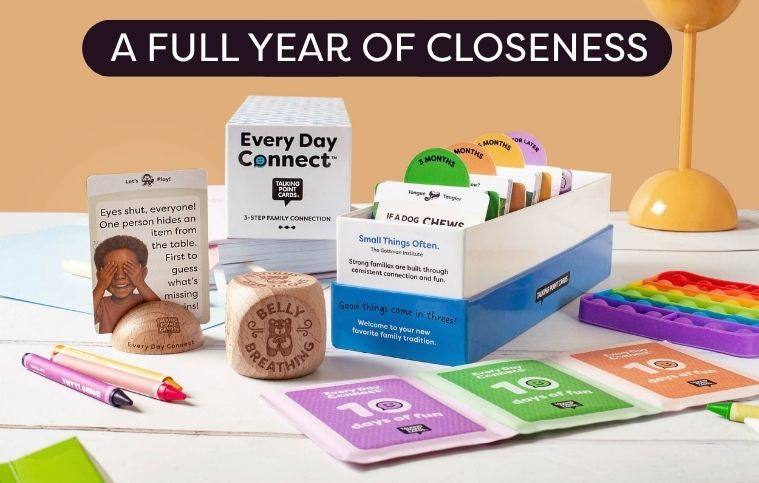SHOP
About
The Surprising Power of Family Chit Chat
How Simple Conversations Can Boost Your Child's Academic Game

If you're a parent who's paranoid about your kid's report cards, then grab a seat and lean in close, because I'm about to lay down some convo wisdom that could be a game-changer for your young scholar's academic prowess.
You know that thing we do as parents? That thing where we ramble on and on to our kids about anything and everything while they impatiently wait for us to shut up so they can go watch YouTube?
Well, it turns out that very rambling - that non-stop exchange of words and ideas between parents and children - may actually have some profound effects when it comes to aiding that cuddly little brain develop into an academic beast.
It's a phenomenon that researchers have been exploring for decades now, and the findings are pretty staggering.
The basic idea is this: Kids who grow up in families that prioritize frequent, open conversations tend to have stronger language, cognitive, and academic skills overall.
Think of it like this - if a kid's brain is a muscle, then family conversations are like the weights and reps that help strengthen and grow that brain muscle over time.
Let's dive in and learn more about how the simple act of chatting with your child can flex their grey matter.
The Building Blocks of Brain Power: Language and Vocabulary Gains

You know that phase early on when your kid is just beginning to speak and every new word is like a tiny miracle? "Mama... Dada... ball... doggy!" It's one of the most delightful times.
Well, it turns out that all that basic vocabulary building that happens through frequent parent-child conversations in those early years plays a huge role in setting kids up for academic success down the road.
Studies have consistently shown that kids from families who converse regularly have much larger vocabularies compared to kids from less conversant families. This makes sense, right?
The more words you expose kids to in conversation, the more words they'll understand and be able to use themselves.
But bigger vocabularies at a young age don't just help with communication skills in that moment - research indicates they also set the stage for more advanced language comprehension and reading capabilities later on. Kids who know more words, in essence, have a much easier time understanding the words they encounter when learning to read. And strong reading skills are the foundation for virtually all academic subjects.
So keep that conversational ball rolling with your young'uns, even when you feel like you're talking to a brick wall! It's building their little vocabularies, word by precious word.

Feeding Curious Minds: How Conversations Boost Critical Thinking
Of course, it's not just about wordsmithing. Childhood conversations with parents don't only build language skills - they also promote deeper cognitive development by constantly feeding kids' inherent curiosity about the world.
Think of all the crazy, random questions kids ask, like "Why is the sky blue?" or "Where do colors come from?" These illogical little queries that seemingly come out of nowhere are their ways of navigating and making sense of their surroundings. Every time you take the time to
respond to one of these mind-benders in a substantive way, you're helping exercise your child's critical thinking faculties.
Parents who make a habit of patiently fielding these questions and taking them seriously are giving their kids' brains a workout in reasoning, logic, and general problem-solving. By having to formulate their own explanations and justifications, parents reinforce crucial cognitive skills that translate directly to academic performance in analytical subjects like math, science, and even philosophy.
So yeah, it may drive you nuts getting bombarded with all those bizarre questions day in and day out. But remember: Every time you humor your kid's curiousity through thoughtful conversation, you're sharpening those little critical thinking knives that will serve them tremendously when it comes time to slay academic assignments and standardized tests. It's an investment that'll pay dividends.
Fostering the Student-Teacher Connection Through Quality Conversation

There's another big way family conversations can boost a child's academic game that's easy to overlook: By setting a positive example of open, reciprocal communication from a young age, kids are much better prepared for the conversational dynamics of a classroom setting.
Think about it - so much of thriving in an academic environment depends on a student's ability to understand what a teacher is explaining, then clearly articulate their own perspectives, ideas, and questions in response. These conversational skills of active listening and confident
self-expression are things kids absorb through years of frequent back-and-forth with their parents.
Families where kids are not only allowed, but encouraged to respectfully engage in discussions, ask questions, and voice their opinions are giving their children invaluable training for academic discourse. These kids learn from an early age that conversation is a two-way exchange of ideas rather than a passive, one-way transmission of information.
Later on in school, a child who is used to this conversational flow is going to be far more adept at cultivating an open, productive rapport with teachers. They'll be comfortable listening attentively, thinking critically, then expressing their comprehension or confusion instead of zoning out like a zombie. And that open channel of teacher-student communication is absolutely vital for learning retention and classroom success.
Just imagine the confidence and assertiveness it takes for a student to be able to politely let a teacher know if an explanation went over their head, or to respectfully disagree with a point and ask for clarification. That stuff does not come naturally - it has to be modeled, practiced, and
reinforced over time. And that all starts with open, reciprocal family conversation at home.

The Hidden Perks: Stronger Bonds, Less Anxiety, More Engagement
Now as tempting as it may be to declare "Okay, I get it, thanks for the tip, I'll start talking to my kids more!" and leave it at that, hold up one sec. Because the conversational benefits to academic performance extend even further beyond the core intellectual factors.
It's been shown that kids who grow up in families that prioritize open communication tend to have stronger senses of trust, confidence, and connection with their parents and siblings.
Frequent positive interaction through conversation helps solidify family bonds. Consciously or not, kids who feel closely bonded to their families tend to have less social anxiety and feel more at ease engaging vocally with teachers, peers, and new figures of authority like professors and bosses later in life. This translates to less shyness, fewer inhibitions about participating in class, and generally more confidence as a student.
On top of that, there's evidence that students who come from families that place a high premium on conversation tend to be more motivated and engaged learners overall. They're used to having their curiosity indulged from a young age through open discourse, and so they show up
to their academic journey with more enthusiasm for understanding and less resentment about being forced to sit still and be quiet all day.
So while ramping up the family convos might help feed your child's brain and boost their language, reasoning, and communication skills, it has this beautiful "two-for" effect where it simultaneously nurtures their sense of connection, confidence, and motivation as a student.
Double whammy!
Make It Happen: Some Conversation-Starting Tips to Try

Okay, you're hopefully convinced by now of the incredible importance of incorporating more good ol' fashioned conversation time into your family routine. But how the heck do you actually do it, you ask? Parenting is already such a chaotic juggling act without having to improv in-depth discourses.
Not to worry, here are a few simple tips that can help make regular conversations a more seamless part of your family's day-to-day life:
-
Car Talks: There are few better conversation catalysts than a long drive. Whether you're carting your kids around to school, activities, or a trip, make it a rule that you keep phones and devices away so you can take the time to catch up and gab during those long stretches in the car.
-
Dinner Table Discussions: The classic family dinner is a time-honored tradition that needs to make a comeback. By having everyone sit down for a meal together each night with no TV or devices, you open the door for relaxed, natural conversation to flow. You can even make it interactive by going around having everyone share their highs, lows, and interesting things they learned from the day.
-
Conversation Starters on Rotation: If the conversational juices just aren't flowing freely in your household, create a list of fun, thought-provoking questions and rotate through one per day at dinner or in the car. For example, "If you could have one superpower, what would it be and why?", "What's the most amazing natural wonder you'd want to see?", or "If you could switch lives with any fictional character, who would it be and why?" This strategy sparks dialogue from creative angles that kids find engaging.
-
Listen, Listen, Listen: One of the most powerful acts when fostering good conversation is to be an active, empathetic listener. Kids will clam up in a heartbeat if they feel you're half-paying attention or waiting to jump in with lectures. Ask questions that show you're listening, nod and make eye contact, and avoid immediately judging or shutting down their thoughts. It takes practice but gets easier over time.
-
Resist the Awkward Pauses: Conversations have natural stops and starts. Don't feel the need to rapid-fire fill every silence. Kids sometimes just need a little time to process their thoughts before responding. Give it a few beats before jumping in again.
-
Seize the Spontaneous Moments: Not every conversation has to be this big scheduled affair. Take advantage of spontaneous pockets of downtime like waiting rooms, riding public transit, doing chores together, etc. Use that mundane in-between time to strike up little bouts of back-and-forth when your kids least expect it.
The overall key is making conversation a comfortable, consistent part of your family's lifestyle over the long haul. It's normal for it to feel a bit forced or clunky at first. But as you all get into the routine and habit, you'll be amazed at how second-nature it becomes to fill those little bits of time with talk instead of just zoning out into separate screens.
And who knows, before long, your lil' academics may be so skilled in the art of discourse that they start correcting your grammar and assertions. The dream!

So Go Ahead, Become a Rambling Conversationalist Parent
There's a reason why so many gurus, philosophers, and thought leaders in history - from Socrates to Neil deGrasse Tyson - have championed the intrinsic value of a good humble conversation.
Frequent, open discourse quite literally feeds the mind. It stimulates critical thinking, sharpens language skills, and pushes our brains to grapple with new ideas. And as we've covered here today, those very same intellectual rewards extend big time to children who are fortunate
enough to grow up in family environments brimming with regular conversation.
From building vocabulary and expanding their knowledge base as toddlers to developing stronger comprehension, communication and analytical skills that pave the road for academic success... making an effort to chat, ramble, and gab more with your kids goes such a long way
in fueling their minds for the classroom challenges ahead.
So even if you feel like you've got nothing interesting to say, or you're tired of listening to your ten-year-old's bizarro theories and non-sequitur tangents, keep the conversational ball rolling anyway. Be curious, ask questions, resist the urge to shush them or cut them off. You'll be amazed at how contagious it can be once you make conversation a priority and lean into it. Before too long, you may find yourself sucked into a marathon existential debate after innocently asking, "So how was school today, sweetie?"
And that, my friends, is a sign of academic success to come. Because kids don't become insightful philosophers, thinkers and lifelong learners by shutting up and zoning out - they get there through years and years of their parents rambling on, asking questions, indulging their curiosities, and laying the discursive groundwork for inquisitive minds to blossom.
So gab away, my conversationally-inclined parents. Gab away to your little nerds' hearts' delight.
The future of their education will be all the richer for it.
LIKED THIS ARTICLE?
SIGN UP FOR MORE!







